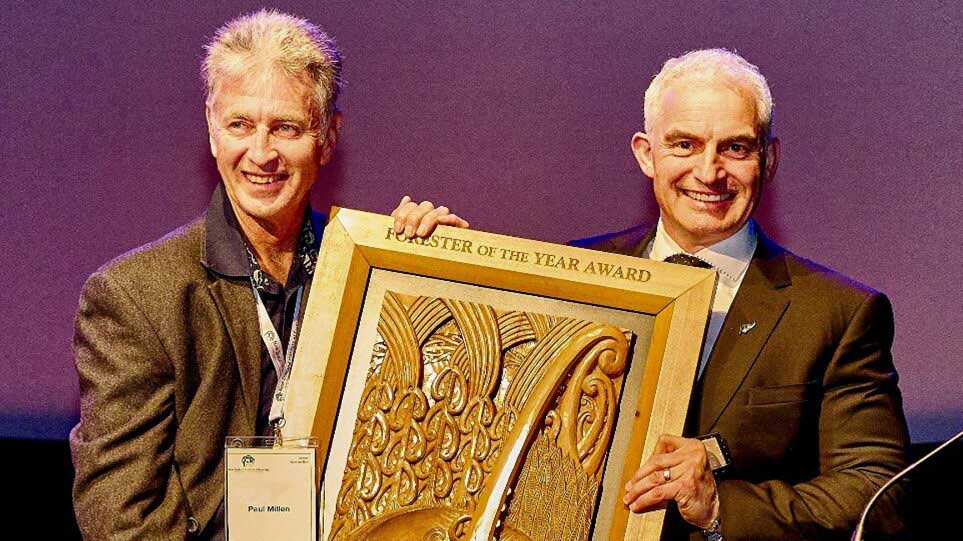Seeing the wood and the trees


The forestry industry is in good hands.
A Marlborough man nominated by his colleagues for a top national award has been named as New Zealand Forester of the Year.
The New Zealand Institute of Forestry (NZIF) has recognised Paul Millen in its 2021 awards, held in Wairarapa recently.
NZIF Forester of the Year is a highly coveted prize, which rewards a person for their outstanding contribution to the forestry sector throughout the year.
The nomination certainly came as a surprise to the 62-year-old who says it is a real privilege to be recognised in this way.
“The award was unexpected. It is certainly a privilege to be recognised by the institute and to be recognised by my peers. In some ways, it is an indication that the institution is diversifying New Zealand forestry which is great to see.”
Paul studied through the University of Canterbury’s School of Forestry (Kura Ngahere) and graduated in 1980.
The University of Canterbury is the only university in New Zealand to offer professional forestry degree programmes, including undergraduate programmes run through the School of Forestry and the College of Engineering.
It was here that Paul attained scientific knowledge, drive and passion for all things trees which opened many doors for him over the years, he says.
His skillset has allowed him to work on numerous projects and with a diverse range of people from professional foresters to tree enthusiasts.
The award is testimony to the high standard of research work Paul has done into eucalyptus. He establishing trials in various parts of the country, initially to develop durable untreated posts for and around Marlborough’s vineyards.
In 2004, Paul then teamed up with his former Canterbury University School of Forestry friend Shaf van Ballekom, CEO at Proseed, owned by Ngāi Tahu, the largest forest seed producer in Australasia.

They linked to the School of Forestry to establish the New Zealand Dryland Forests Initiative (NZDFI) which is a eucalypt tree improvement and forest research programme with wood quality a major component. NZDF has attracted internationally renowned researchers.
Paul has been involved in the Marlborough community since arriving in the 1980s, working in various roles for the local authority and environmental and community projects. These included a major role in developing the Wither Hills Farm Park as a working farm and public recreation area for the Marlborough District Council.
Such involvement he says has been a real pleasure and he is thankful for the opportunities that have come his way.
“I'm grateful to have had the opportunity to have been involved in the Wither Hills Farm Park (when he was in his 20s) and the work with local government.
“People have benefited greatly from the trees that have been planted. Trees and forests have a wide range of benefits for the whole community.”
Paul says one of the great connections and work he has been involved with in recent years has been with the Marlborough Significant Natural Areas Project.
The project involves Marlborough District Council collecting information about natural areas on private land, with the aim of working in partnership with landowners to help protect these areas.
“I still have a lot of enjoyment with the Marlborough Significant Natural Area Project (underway since 2000) - working with private landowners who have areas of native forests, and restoration planting.”
The Marlborough Significant Natural Areas Project involves three main types of work:
● Carrying out an ecological survey of areas on private properties to identify the sites and issues.
● An assistance programme to encourage and help landowners to protect these identified sites was established in 2003 and since this time more than 80 significant natural areas have been protected.
● Sites that have been protected are revisited every two to three years to check that management objectives are being met.
Paul says his ethos and vision for New Zealand forestry is primarily about being self-sufficient. Having the foresight and the knowledge to plant early allows such reliance.
“I’ve always been about the practical application of forestry and what types of wood benefit various sectors according to their needs. What is practical and going to work in the forestry sector?”
Paul’s tree breeding programme to improve ground durable eucalyptus is testament to the theory versus practical component of his work.
Paul had identified a group of durable eucalypt species that he had planted in his own research trials and in trials planted by other local landowners who were interested in testing these species.
Within four years of starting that, he was planning a genetic research programme, and that research programme was supported by the Marlborough Research Centre Trust as well as the School of Forestry (University of Canterbury) Proseed NZ Ltd, the Marlborough District Council, Marlborough Lines and the NZ Farm Forestry Association.
In 2008 he got funding from The Agricultural and Marketing Research and Development Trust, which launched the NZ Dryland Forests Initiative tree breeding programme with the first 20,000 trees planted in 2009. In 2010 the NZDFI got Sustainable Farming Fund money.
Paul lives on Queen Charlotte Drive in Picton and has planted an extensive range of trees on the property over the past 37 years.
His work with his enterprise Marlborough Timbers, now a reputable, specialised timber merchants’ business, has given him a great deal of confidence from a ‘wood business model’.
They source timber from Tai Tane Forest (Havelock) with the business owned by Paul and his brother Ash. Tai Tane is sustainably managed to produce high quality hardwood and softwood timbers. Seedlings have been planted regularly since 1984, with over 5,000 trees now maturing.
Marlborough Research Centre Chief Executive, Gerald Hope, says Paul recognised early on that regional communities needed to build resilient, diverse economies with newly planted eucalypt forests now located from Canterbury to Northland.
“Paul successfully sought funding from many sources - government, local authorities, industry and farmers – resulting in $9 million being raised to date,” says Gerald Hope. “It has expanded beyond Marlborough to include 36 sites in eastern and northern NZ, breeding durable eucalypts with high wood quality.”
